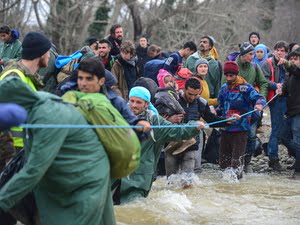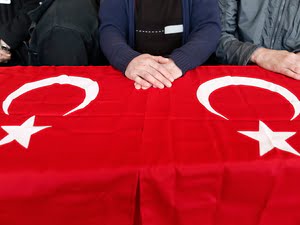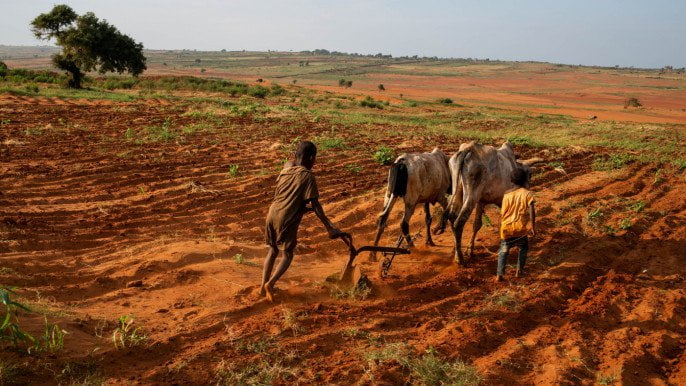

Idomeni, Greece – Macedonia’s police and army were “taking steps” to return a crowd of migrants from the Greek refugee camp Idomeni and enhance security after they “illegally” crossed the sealed border on Monday, the Interior Ministry said.
“More than 700 migrants illegally entered from Greece … Police and members of the Macedonian army are taking steps for their return to Greece,” the statement said.
The ministry also said that police and the military were working “to improve security in places where large groups of migrants were observed crossing the border.”
TV Sitel said around 2,000 people arrived in Moine, five kilometres to the west on the Macedonian side of the border, after a four-hour trek that included the crossing of a river where three migrants drowned earlier that same day.
The travelling group encountered Greek police, who did not attempt to stop them, but advised them that they would be returned by Macedonian police waiting on the other side.
Macedonia’s state news agency, MIA, later reported that the country’s crisis management body was holding a large group of migrants after they were intercepted enroute.
People helped each other cross the small river Crna Reka, swollen after days or relentless rain, where three Afghan migrants drowned hours earlier while trying to sneak into Macedonia.
The victims were part of a 26-member group trying to cross the border, which Macedonia sealed to migrants last week, causing a massive backlog of people on the Greek side.
Austrian Interior Minister Johanna Mikl-Leitner, whose country is the penultimate stop for many migrants striving to reach wealthy Germany, urged the people stranded in Idomeni to stay in Greece.
“Whoever means well by the people in the camp, they should encourage them to accept the warm, safe quarters already provided in Greece and to have themselves looked after there,” Mikl-Leitner said.
She blamed “those who instill false expectations” in the desperate migrants for Monday’s chaotic and dangerous rush to the Macedonian border.
More than 10,000 migrants, mostly Syrian and Iraqi refugees, have been stranded at Idomeni after Balkan countries first restricted, then stopped the flow of migrants towards wealthy EU countries.
Aid organizations have voiced concern that stifling the regulated migration flow could lead to the smuggling of people and potentially dangerous attempts at illegally scaling borders.
In the Aegean Sea, meanwhile, rescuers were searching for eight migrants missing after their boat overturned in the rough sea early Monday morning.
Greek coastguard spokesman Nikos Langadianos told national TV that five people were rescued near the island Kos, as vessels from the Greek and Italian coastguard – assisted by a helicopter – searched the sea for survivors.
Greek Aegean islands last year became the main gateway for migrants, including Syrian and Iraqi refugees, trying to reach Europe from Turkey.
At least 455 have drowned in the Aegean Sea this year alone, according to data from the International Organization for Migrations.
From Greek islands, the people are ferried to Athens, then had typically continued their trip north and west, through Macedonia, Serbia, Croatia, Slovenia and Austria.
The European Union is now negotiating a deal with Turkey to also stem the number of migrants and asylum seekers who attempt to cross the Aegean Sea, hoping to finalize it at a summit in Brussels this week.
The planned deal foresees Ankara taking back any new migrants arriving in Greece, while the EU would agree to directly resettling an equal share of Syrians living in Turkey.
The plan is meant to discourage migrants from putting their lives in the hands of smugglers, but it has faced a barrage of criticism from human rights advocates and high-ranking UN officials, who have called the approach inhumane and illegal.
On Monday, Spanish Foreign Minister Jose Manuel Garcia-Margallo joined the critics’ ranks, saying that his country is seeking changes to the “unacceptable” agreement, which he believes could breach people’s human rights.
Madrid has given a mandate to its EU ambassador to seek a correction of the legal texts, Garcia-Margallo said. He added that anyone who arrives on European soil should be allowed to file an asylum request that should be assessed individually, with a right to appeal.
[Source:- DPA]





